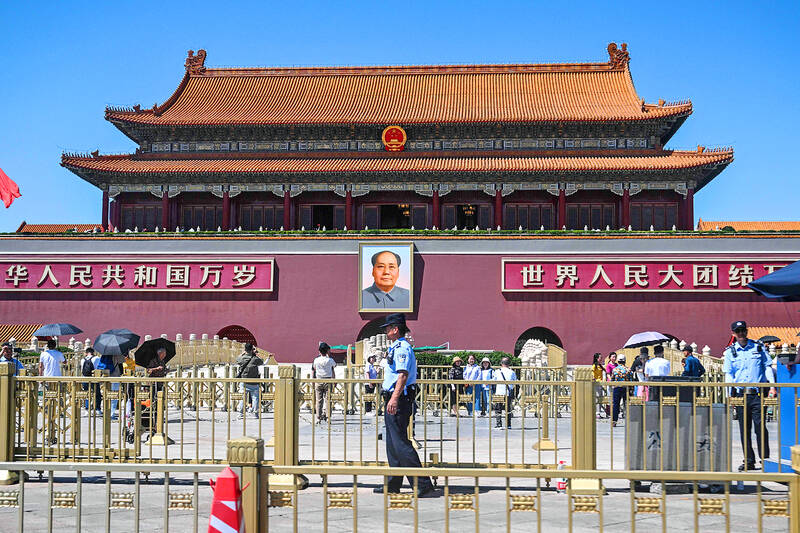Half of Japanese companies invested in China expect the economy to get worse this year, according to a new survey, and the vast majority do not plan to increase investment.
About 50 percent of the 1,741 Japanese companies surveyed by the Japanese Chamber of Commerce and Industry in China said that they expected the economy to get worse this year, an increase from the 37 percent who said that at the end of last year.
Another 34 percent said China’s economy would perform this year the same as it did last year, with only 15 percent of firms expecting it to improve.

Photo: AFP
China’s economy grew faster than 5 percent in the first three months of the year, but that does not seem to have encouraged companies to step up investment. About 44 percent of the surveyed firms said they would cut outlays this year, and another 40 percent planned to keep them unchanged. Those numbers were broadly unchanged from the survey at the end of last year.
The continued pessimism from Japanese firms bodes poorly for Beijing’s efforts to attract foreign firms back after the COVID-19 pandemic.
The flow of investment into China from the rest of the world fell 56 percent in the first quarter from a year earlier, according to official data released last week.
The amount from Japan dropped 1.2 percent to the lowest level for the first quarter in comparable data back to 2014.
The survey conducted from mid-March to the middle of last month did not provide a margin of error.
Japan is the most important single source of investment for China, accounting for about 6 percent of the total stock of foreign direct investment into the nation in 2021, according to a report by academics including Bert Hofman, previously the head of the World Bank’s office in China.

When an apartment comes up for rent in Germany’s big cities, hundreds of prospective tenants often queue down the street to view it, but the acute shortage of affordable housing is getting scant attention ahead of today’s snap general election. “Housing is one of the main problems for people, but nobody talks about it, nobody takes it seriously,” said Andreas Ibel, president of Build Europe, an association representing housing developers. Migration and the sluggish economy top the list of voters’ concerns, but analysts say housing policy fails to break through as returns on investment take time to register, making the

‘SILVER LINING’: Although the news caused TSMC to fall on the local market, an analyst said that as tariffs are not set to go into effect until April, there is still time for negotiations US President Donald Trump on Tuesday said that he would likely impose tariffs on semiconductor, automobile and pharmaceutical imports of about 25 percent, with an announcement coming as soon as April 2 in a move that would represent a dramatic widening of the US leader’s trade war. “I probably will tell you that on April 2, but it’ll be in the neighborhood of 25 percent,” Trump told reporters at his Mar-a-Lago club when asked about his plan for auto tariffs. Asked about similar levies on pharmaceutical drugs and semiconductors, the president said that “it’ll be 25 percent and higher, and it’ll

CHIP BOOM: Revenue for the semiconductor industry is set to reach US$1 trillion by 2032, opening up opportunities for the chip pacakging and testing company, it said ASE Technology Holding Co (日月光投控), the world’s largest provider of outsourced semiconductor assembly and test (OSAT) services, yesterday launched a new advanced manufacturing facility in Penang, Malaysia, aiming to meet growing demand for emerging technologies such as generative artificial intelligence (AI) applications. The US$300 million facility is a critical step in expanding ASE’s global footprint, offering an alternative for customers from the US, Europe, Japan, South Korea and China to assemble and test chips outside of Taiwan amid efforts to diversify supply chains. The plant, the company’s fifth in Malaysia, is part of a strategic expansion plan that would more than triple

Taiwanese artificial intelligence (AI) server makers are expected to make major investments in Texas in May after US President Donald Trump’s first 100 days in office and amid his rising tariff threats, Taiwan Electrical and Electronic Manufacturers’ Association (TEEMA, 台灣電子電機公會) chairman Richard Lee (李詩欽) said yesterday. The association led a delegation of seven AI server manufacturers to Washington, as well as the US states of California, Texas and New Mexico, to discuss land and tax issues, as Taiwanese firms speed up their production plans in the US with many of them seeing Texas as their top option for investment, Lee said. The